It has been four years since 80,000 fans crammed into Wembley Stadium to witness Carl Froch’s crowning moment, as he dispatched of bitter rival George Groves in the eighth round of their highly-anticipated rematch with a pulverising right hand that rendered Groves unconscious.
For Froch, a battle-hardened stalwart of the fight game, that single blow would become the signature moment in a sterling career that saw ‘The Cobra’ claim four World titles, and defeat no fewer than nine past-or-present World champions during his twelve-year vigil.
But what of his opponent that night?
Entering the first bout with Froch, some six months prior, then-reigning British and Commonwealth super middleweight champion George Groves was given slim-to-no chance in defeating the formidable champion.
However, after a sensational opening that saw Groves drop the granite-chinned Froch with a crushing right hand, the ‘Saint’ would go on to raise his stock immeasurably – that was, of course, until referee Howard Foster called a premature end to proceedings with a highly-questionable ninth round stoppage.
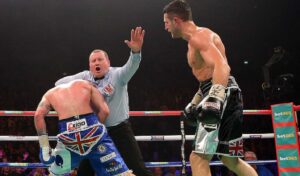
Nevertheless, Groves would dust himself off and bang the drum for a rematch, which – after a heavily-hyped build-up – would take place at England’s national football stadium. The rest, as they say, is history.
A visibly dejected Groves would afford Froch praise in his post-fight interview with Sky Sports, but a steely undertone from the 26-year old and a vow to return to World level were perhaps the most telling parts when looking back.
“Fair play to Carl. He caught me. I felt like I was doing well, I was in my groove and Carl caught me with a shot. That’s boxing. I’ll come back. I’ll come back bigger and better and stronger. Fair play to Carl, I congratulate him. I’ll come again.” said Groves.

While Froch rode off into the sunset basking in the glory of his most famous night, Groves would return to action less than four months later against European champion Christopher Rebrasse.
The venue? The scene of the crime, so to speak; Wembley Arena… a mere stones throw from where the Hammersmith man had been dispatched of so emphatically just 112 days prior.
Despite rebounding with a clear – but competitive – unanimous decision victory, it would seem that the psychological scars from the Froch rematch were apparent for all to see.
The snappy, sharpshooter-style honed by former-trainer Adam Booth had been replaced by a Groves that looked unsure of himself, deciding to stand at close-quarters and trade with his rugged-yet-limited opponent.
Following the victory, Groves would call for a third instalment with old-enemy Froch, who worked the bout as part of the Sky Sports commentary team. A wry grin from ‘The Cobra’ poured cold water on any such proposal – genuine or not – but the sheer mention of Froch’s name ominously pointed to the fact that Groves was yet to put that chapter of his career to bed.
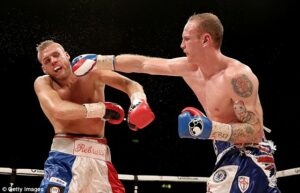
In overcoming Rebrasse, Groves would collect not only the European belt, but also the WBC Silver title, affording him a lofty ranking with the governing body and putting himself in position for a shot at World champion Badou Jack.
A routine seventh round TKO of career super welterweight Denis Douglin would follow by year’s end and, less-than six months after suffering back-to-back defeats in World title attempts, Groves was named as mandatory challenger to Jack’s WBC World super middleweight crown.
Though the fight with Jack would not materialise for some ten months, it was testament to the character of Groves that following such a demoralising loss(es), he would find himself contesting World honours so soon after. Furthermore, he would enter the bout with Jack in September of 2015 as a clear favourite with bookmakers.
The bout, however, would once again highlight some of the fragilities that had plagued Groves throughout the Froch fights. He was caught cold in the opening round, dropped by a right hand to the temple from Jack, and once again faced an uphill battle in his quest become World champion.
Groves would rally and enjoy periods of success against the Swede, but again looked a far-cry from the slick, heavy-handed sniper that terrorised Carl Froch for seven rounds in their first fight. He would drop a split decision to Jack, and at just 27-years-old, had come up short in his third World title attempt.
Shortly after the bout, Groves would part company with trainer Paddy Fitzpatrick and his career, for all of its early promise, was left seemingly in tatters.
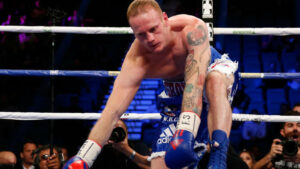
Following the defeat to Jack – a loss that admittedly looks “better” in time due to Jack’s successes thereafter – Groves would link up with trainer Shane McGuigan, son of Ireland’s featherweight icon Barry McGuigan.
McGuigan, who at the time boasted Belfast star Carl Frampton as part of his stable, would go about rebuilding Groves from the ground up. Focusing on the lauded jab that had seen Groves breeze through domestic level, and breathing confidence back into his new charge.
With two quick-fire stoppage victories over Andrea Di Luisa and David Brophy, the swagger and confidence that Groves had been renowned for began to slowly creep back into his work. His footwork was more deliberate, his game plans more decisive and his punches more spiteful and carefully selected.
A domestic dust-up with another World title “nearly man” Martin Murray would follow in June of 2016, and with it, the opportunity for Groves to send out a signal of intent in the latest chapter of his career.
Despite the bout being billed as a “50-50 fight” by many spectators, Groves would dominate proceedings from the opening bell, utilising his size and reach advantage to pummel the St. Helens man from range en route to a lopsided twelve round unanimous decision.
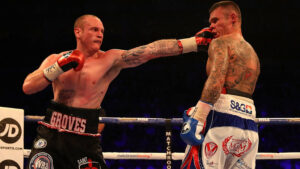
After producing arguably his finest performance since the first encounter with Froch, Groves would have further cause for celebration following the birth of his son. The once cocksure, rubik’s-cube-solving whippersnapper had been replaced by a more measured, objective and – arguably – more secure, young family man.
His next bout would see Groves face German Eduard Gutknecht in an eliminator for the WBA World super middleweight title. On the verge of yet another shot at glory, Groves would insist that becoming a father would not dim his “killer instinct”.
“I’m thoroughly enjoying being a dad. I’m not sure exactly what’s changed in terms of boxing yet, but day-to-day life has obviously changed.” he told The Sun.
“The killer instinct is there and I definitely haven’t become soft. When the gym doors shut I’m fully focused.”
They were seemingly off-the-cuff comments that foreshadowed what was an ill-fated night at Wembley Arena.
Groves would put a relentless beating on the teak-tough Gutknecht, winning via twelve round decision in a bout that lacked any sort of real competitiveness throughout.
After such a sustained onslaught, Gutknect would collapse in his dressing room after the fight, slipping into a coma and suffering life-changing injuries as a result. To this day, he remains mute and wheelchair-bound, and it is a tragedy that Groves later admitted to struggling with on a daily-basis.
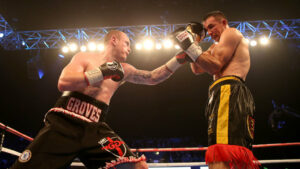
In a career of ups-and-downs, the injuries to Gutknecht represented something of a different challenge for Groves.
Despite being absolved of any blame by Gutknecht’s family, as well as auctioning off a pair of shorts in a bid to raise money for his fallen foe, Groves would pay an emotional tribute to Gutknecht ahead of his next fight, his fourth World title challenge against Fedor Chudinov in May 2017.
“Selfishly, while I’m still fighting I’m always going to struggle with his situation.” Groves told 5 Live Boxing.
“It’s a horrible thing. I struggle with it, my wife struggles with it.
“It’s very distressing. We don’t know if his situation will deteriorate or if anything will happen.
“We feel for him, his wife, kids and family. It’s horrible.” he finished.
Typically of Groves’ rollercoaster career, he would battle on, overcoming his demons – as well as slow start to the bout – to finally achieving his lifelong ambition of becoming World champion, inflicting a sixth round TKO defeat on Chudinov at Bramall Lane, Sheffield.
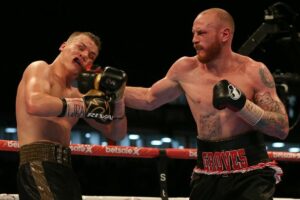
While his initial reaction was one of elation and relief, the man once famed for his witty press-conference barbs and one-liners would pay an emotional tribute to Gutknecht in his post-fight interview with Sky Sports.
“I’d like to dedicate this to Eddy Gutknecht, who is still not well.” said a visibly moved Groves.
“He’s on my mind all of the time. I lie when I say he’s not. I hope he makes a recovery. Me and my family pray for him every day.
“It’s a cruel sport, but… I’m just so thankful for this.”
While the burden of becoming World champion had seemingly been lifted from his shoulders, it was clear to all that the psychological impact of Gutknecht’s injuries still weighed heavily on Groves’ mind.
It is a chapter of his career – and his life – that remains open and, for the time being at least, shows no signs of closure.
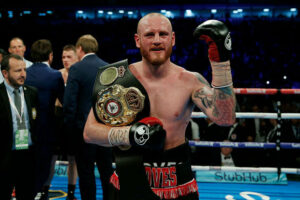
Becoming World champion can have a variety of affects on a fighter. Some flourish, whereas others, having reached the pinnacle of the sport and achieving their dreams, can often lose motivation.
It would seem that the events of years gone by – the Froch fights, the loss to Badou Jack and the incident with Eduard Gutknecht – have forged a psychological steeliness in Groves that many questioned the existence of in the fledgling stages of his career.
He had overcome immense hardships, both inside the ring and outside of it, and realised his ambitions.
Though his career had been long and storied, Groves was just two months removed from his 29th birthday when capturing the WBA ‘Super’ World title against Chudinov. With the ghosts of the Froch fights now seemingly laid to rest, a fruitful reign as champion seemed next on the list for the ‘Saint’.
Such was the timing of his World title victory, he would be given the perfect opportunity to flourish on the big stage – where he had fallen short in the past – with the inception of the ‘World Boxing Super Series’.
The tournament, that pitted eight of the world’s top super middleweights against one and other in a knockout-style format, saw Groves listed as the top seed. In entering the ‘WBSS’, Groves would defend not only his WBA title, but also have the opportunity to stamp his name as the division’s number one fighter.
The quarter-final bout would pit Groves against former amateur teammate and fellow Brit Jamie Cox, with the two squaring off in the familiar surroundings of Wembley Arena in October 2017.
Entering the contest as a red-hot favourite with bookmakers, Groves would dispatch of the game Swindonian with a brutal right uppercut to the body in the fourth round, sending Cox crashing to the canvas in agony.
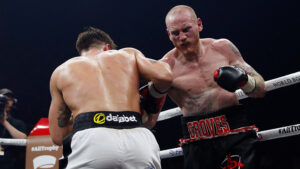
Entering a World title bout for the first time as champion had, judging by his performance against Cox, brought out the best in Groves.
The relationship with Shane McGuigan was now reaping significant fruits for his labour; Groves had rattled off six consecutive victories, scored four knockout wins, won a World title and made a successful defence.
Following the victory over Cox, the tournament would throw up another domestic clash for Groves in the semi-final: this time, a mouth-watering clash with controversial IBO champion and former sparring partner Chris Eubank Jr.
Now a seasoned veteran of high-profile match-ups, Groves would approach the build-up to the bout in stark contrast to the earlier version of himself. There were no attempted mind games, little in the way of insults and no outlandish fight predictions that had become synonymous with his fights with Froch.
Where the younger, inexperienced Eubank Jr. seemed to relish the opportunity to try and gain a mental edge over his opponent, a stoic Groves offered little in response, instead focusing on the task at hand and promising a dominant victory.
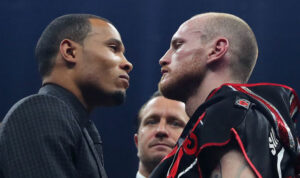
The fight itself would produce less of the fireworks predicted by Team Eubank and, true to his word, would see Groves outbox his Eubank Jr. virtually from the first bell to the last.
It was a performance of quality, control and discipline that had lacked in the early stages of his career.
Tasked with – and sticking to – a carefully-constructed game plan, Groves piled up the points against his increasingly-ragged looking opponent, hurting him at regular intervals with crips right hands to the head and body.
However, true to form, Groves would face one final obstacle in the last round of the bout.
After flicking a seemingly-innocuous left jab out at Eubank Jr., Groves would suffer a gruesome shoulder injury, with his arm coming detached from its socket during the first minute of the round. The injury would spark Eubank Jr. into life, who poured forward relentlessly in a bid to secure the come-from-behind stoppage.
Biting down on the gumshield and buying time intelligently, Groves would safely negotiate the remainder of the session and claim the unanimous decision victory.
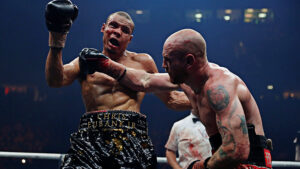
It was a performance that both encapsulated his career to date, as well as displayed the progression and development in him as both a fighter and a man.
How Groves would have reacted to the pre-fight jibes or the last minute injury as a precocious 26-year-old is anyone’s guess. This version of Groves, however, responded in spades.
Upon the final bell, conversation immediately switched to concerns over Groves’ fitness – particularly with a scheduled final to take place. His absence from the post-fight press conference exacerbated those concerns.
With promoter Kalle Sauerland giving no guarantees of rescheduling the final to accommodate a fit Groves, rumours began to surface that he would be replaced by the man he had just defeated: Chris Eubank Jr.
However, one day short of four years from that night at Wembley Stadium, Groves would be passed medically fit by doctors to take his place in the final. It was an announcement that was met with widespread approval by boxing fans worldwide.
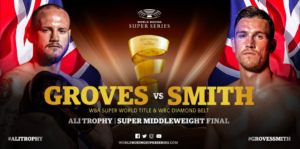
For Groves, a man who had made a career – in his early years, at least – of dividing opinion, for the news to be met with such joy is a testament to the perseverance he has shown in this, the latest chapter of his life.
The once provocative, divisive-figure has been replaced by someone who has shown what is achievable through learning from experience: both good and bad.
Above all else, boxing loves a story: and from that night four years ago at Wembley Stadium, laying unconscious on the canvas with his left leg folded underneath him like a deck chair, who could have foresaw the journey that George Groves has been on ever since?
He will box Callum Smith for the right to be called the winner of the inaugural Ali Trophy, and with it, the opportunity to cement his legacy in the sport.
The opportunity to do so is no more or less than he deserves.
Article by: Rob Tebbutt
You can follow Rob on Twitter at: @RobTebbutt